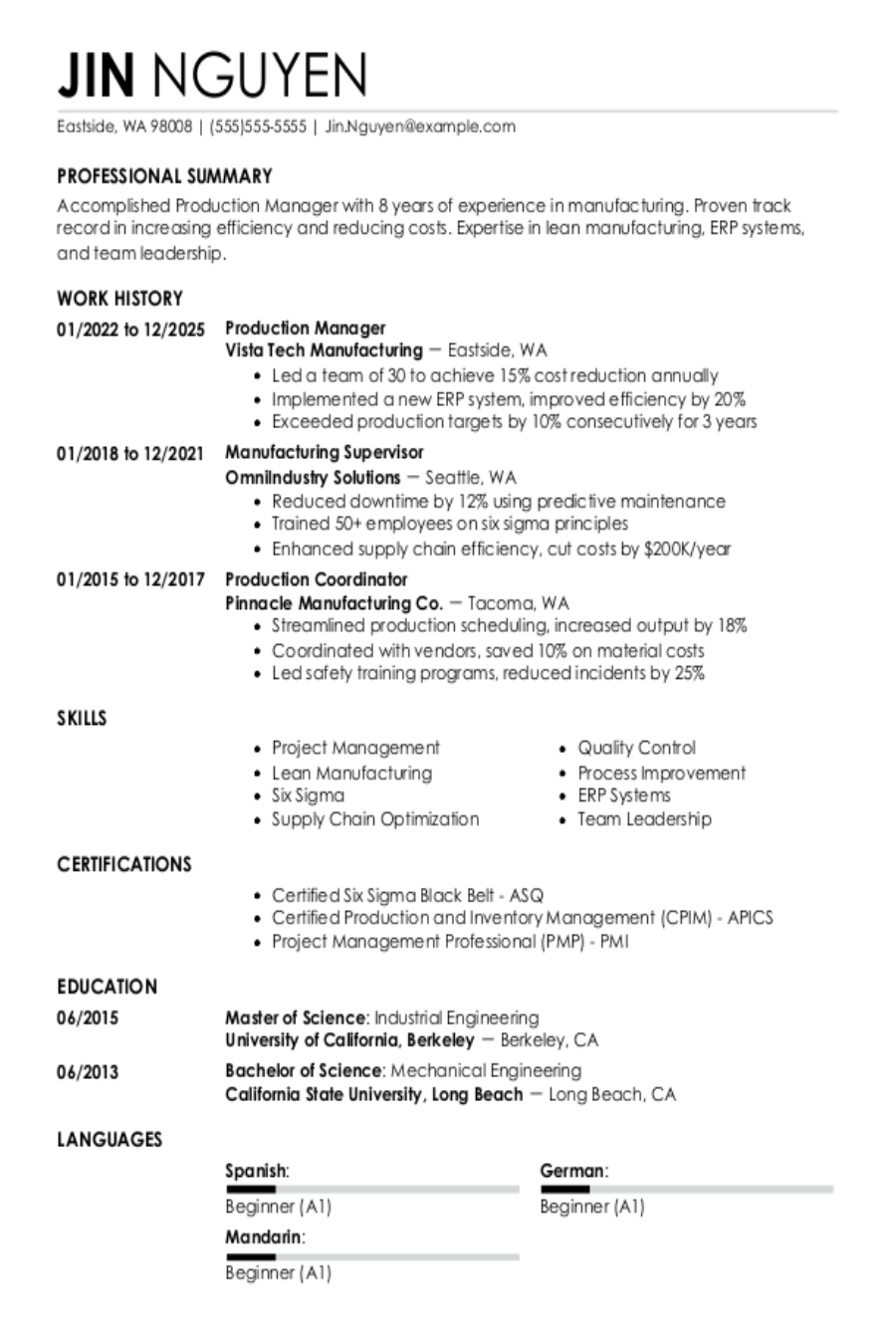Popular Construction Worker Resume Examples
Entry-level construction worker resume
An entry-level resume for a construction worker should focus on relevant skills, safety certifications, physical fitness, teamwork experience, and any hands-on training to demonstrate readiness for the job.
Showcases education: This resume places education near the top of the document to highlight the candidate's expertise despite limited experience.
Emphasizes soft skills: This resume highlights the applicant's strong soft skills, such as teamwork and safety compliance, which effectively mitigate limited experience.
Mid-career construction worker resume
A mid-career construction worker's resume should emphasize hands-on experience, technical skills, and continuous learning to demonstrate their value and adaptability in the evolving construction industry.
Includes mix of skills: This resume effectively combines hard skills, such as OSHA compliance and heavy equipment operation, with soft skills like team leadership and mentoring to present a well-rounded job seeker.
Encourages quick scanning: A well-structured layout highlights essential qualifications, enabling hiring managers to quickly identify key skills and experiences relevant to construction projects.
Experienced construction worker resume
An experienced construction worker resume should highlight key projects, relevant skills, and safety certifications to effectively demonstrate career growth and expertise in the field.
Follows traditional format: The chronological resume format effectively showcases the job seeker's extensive experience, clearly illustrating their career trajectory and accomplishments while making it easy for the reader to track skill development over time.
Optimized for ATS: The resume employs a straightforward design that features a professional header paired with an ATS-friendly resume layout, making it accessible for both human reviewers and automated systems alike.
No experience construction worker resume
A resume for an applicant with no experience should highlight relevant skills, certifications, and any volunteer projects to showcase the applicant's ability and willingness to learn on the job.
Overcomes lack of work history: Emphasizing relevant skills, such as blueprint reading and construction safety, showcases the job seeker's readiness for a construction worker role, despite limited direct experience.
Draws from diverse experiences: Including volunteer work and extracurricular activities can improve a resume by demonstrating practical skills and community engagement. This approach showcases dedication to the construction field, even with limited professional experience.
More resume examples
Additional Guides
Construction Worker Resume Template
Looking to create a standout application? This construction worker resume template serves as a perfect foundation—just personalize it with your own details and skills.
Tao Singh
San Francisco, CA 94106
(555)555-5555
Tao.Singh@example.com
Professional Summary
Seasoned construction worker with 9 years in site management and project coordination. Recognized for improving safety compliance and site efficiency. Proficient in team leadership and blueprint reading.
Work History
Construction Worker
Precision Build Contractors - San Francisco, CA
May 2021 - September 2025
- Improved site efficiency by 30%
- Assisted in $2 million project completion
- Ensured 100% safety compliance
Site Laborer
Prime Construction Co. - San Francisco, CA
May 2016 - May 2021
- Handled daily tasks to meet deadlines
- Reduced material wastage by 25%
- Enhanced workflow efficiency onsite
Building Assistant
BuildRight Services - San Francisco, CA
June 2012 - May 2016
- Assisted in constructing large complexes
- Mentored new hires to quick acclimation
- Contributed to 3% reduction in costs
Skills
- Site Management
- Safety Compliance
- Blueprint Reading
- Team Leadership
- Material Handling
- Project Coordination
- Construction Planning
- Problem Solving
Education
Master's Degree Construction Management
New Jersey State University Newark, New Jersey
May 2011
Bachelor's Degree Civil Engineering
Newark Community College Newark, New Jersey
May 2009
Certifications
- Certified Construction Manager - Construction Management Association of America
- OSHA Safety Certification - Occupational Safety and Health Administration
Languages
- Spanish - Beginner (A1)
- French - Intermediate (B1)
- German - Beginner (A1)
Must-Have Skills on a Construction Worker Resume
A strong skills section is important for showcasing your abilities on a resume.
Skilled trade professionals bring practical expertise and reliability to essential tasks. The skills you highlight should reflect your ability to perform consistently and support quality work. Your resume allows you to show how you contribute to durable results and the smooth functioning of vital operations.
The following data highlights the most sought-after hard and soft skills for construction workers, sourced from industry-specific resume analysis.
When you’re ready to improve your resume with relevant skills, consider using our AI Resume Skills Generator. It provides tailored suggestions based on your job title, ensuring your skill set stands out.
Writing Your Construction Worker Resume
Having explored these effective resume examples, you are now prepared to dive into the details of how to write a resume. We will walk you through each step of the process, breaking down every section for clarity and ease.
List your most relevant skills
An effective skills section on your construction worker resume should highlight both technical skills, such as machinery operation and safety compliance, and essential soft skills like teamwork and communication. By focusing on these areas, you demonstrate your readiness to tackle the demands of the role.
To maximize your chances with recruiters, pay close attention to the job listing and incorporate keywords from the job listing into your skills section. This approach not only aligns your experience with what employers are seeking but also helps you pass through applicant tracking systems designed to filter job seekers.
Example of skills on a construction worker resume
- Proficient in operating heavy machinery and tools for various construction tasks
- Knowledgeable in site safety regulations and best practices
- Strong communicator able to collaborate effectively with diverse teams
- Adaptable and quick to troubleshoot on-site challenges efficiently
Highlighting soft skills on your resume can set you apart from the competition. Employers appreciate interpersonal abilities because they are often harder to develop than technical skills, making them a valuable asset in any construction role.
Highlight your work history
Your work experience section allows you to highlight your achievements and the skills you've developed on the job by using specific examples that illustrate your contributions to projects.
For each job entry, include key details like your job title, the name of the employer, and employment dates. This information helps employers understand your background and supports your experience in the industry. Including quantifiable achievements—such as completing projects ahead of schedule or improving safety measures—can help differentiate you from other job seekers.
Example of a construction worker work experience entry
- Construction Worker
ABC Construction Inc. - Houston, TX
January 2021 - Present - Execute various construction tasks including framing, drywall installation, and roofing with a focus on safety and efficiency
- Collaborate with project managers and subcontractors to ensure projects are completed on time and within budget, contributing to a 15% increase in project delivery speed
- Maintain tools and equipment in optimal condition to improve productivity and reduce downtime by 25%
- Assist in training new team members on best practices for safety protocols and construction techniques, resulting in improved team performance
- Implement quality control measures that reduced rework by 30%, ensuring high standards of craftsmanship
Quantifying achievements as a construction worker is vital for showcasing your skills and reliability. For example, stating that you completed projects 15% under budget while maintaining safety standards demonstrates your efficiency and commitment to quality in the field.
Include your education
The education section of your construction worker resume should clearly list your educational credentials in reverse-chronological order, starting with the most recent. Include any relevant vocational training or certifications while omitting high school diplomas if you have completed further education or specialized training.
If you are currently enrolled in a relevant program or have incomplete education, mention your highest completed level and include an expected graduation date. You may also add bullet points detailing relevant coursework, apprenticeships, or practical skills acquired during your training.
Common certifications for a construction worker resume
- OSHA 30-Hour Construction Safety Certification – Occupational Safety and Health Administration (OSHA)
- National Center for Construction Education and Research (NCCER) Certification – NCCER
- First Aid/CPR/AED Certification – American Red Cross
- Certified Construction Manager (CCM) – Construction Management Association of America (CMAA)
Sum up your resume with an introduction
Creating an effective profile section on your resume is essential for making a powerful first impression. This section serves as your introduction to potential employers, summarizing your qualifications and setting the tone for the rest of your application.
For experienced job seekers, a professional summary is the right choice. It allows you to showcase significant achievements and relevant experiences right at the beginning of your resume. By emphasizing key accomplishments, you position yourself as a strong contender for the job, enabling hiring managers to quickly recognize your value. If your work experience is limited, write a goals-based resume objective that shows your career development and progress.
Professional summary example
Dedicated construction worker with over 10 years of experience in residential and commercial projects. Recognized for consistently delivering high-quality work while adhering to safety regulations and timelines. Expertise in framing, roofing, and site management ensures projects are completed efficiently and effectively.
Resume objective example
Enthusiastic construction worker eager to bring a solid foundation in safety practices and teamwork to a reputable construction firm. Looking to use strong problem-solving abilities and attention to detail to contribute effectively to project success and improve site efficiency.
As a construction worker, your resume profile should be concise and packed with essential information. Keep it within three sentences, focusing on key skills and experiences that stand out. Reserve extra details for your cover letter to maintain a sharp and focused presentation.
Add unique sections to set you apart
Optional resume sections are a great way for you to highlight your unique qualifications as a construction worker. They can set you apart from other applicants by showcasing relevant experiences and skills that may not fit into the traditional format.
These sections allow you to reveal various aspects of your professional persona, such as applicable hobbies or volunteer work. For instance, if you've participated in community building projects or developed skills through hands-on workshops, sharing these details demonstrates both your commitment to the field and your strong work ethic.
Three sections perfect for a construction worker resume
- Technical Skills: Technical skills are essential for construction workers as they demonstrate your ability to operate tools and machinery safely and effectively. Including these skills on your resume showcases your competence and readiness for the demands of the job.
- Tools and Platforms: In today’s construction industry, computer skills are essential. Being familiar with project management software, design tools, and safety compliance platforms can improve productivity and ensure projects run smoothly and efficiently.
- Professional Certifications: Certifications highlight your dedication to excellence in technical roles. They validate your skills and knowledge, ensuring you meet industry standards while boosting your employability and career growth.
5 Resume Formatting Tips
- Choose a format that matches your career stage.
When deciding on a resume format, consider your experience level. If you have significant experience in construction, a chronological format highlights your work history effectively. For those just starting out or with varied experiences, a functional resume can showcase your skills. A combination format works well if you want to present both skills and work history cohesively.
- Pick a smart resume template.
Using a professional resume template is important for making your qualifications stand out. It improves readability and ensures that potential employers can quickly find the information they need. Choose a clean, ATS-friendly template to simplify formatting and make a strong first impression.
- Select an appropriate font.
To improve your resume's readability, opt for a clear and professional font. Fonts such as Arial, Helvetica, or Georgia are excellent choices that ensure both ATS compatibility and ease of reading by hiring managers.
- Use consistent formatting.
Ensure your resume is neatly aligned with uniform margins. This creates a clean, professional layout that captures attention and improves readability.
- Keep your resume to one or two pages.
When crafting your resume, remember that resumes should be one page long in most cases. Keep your content concise and ensure it highlights the skills and experiences that matter most to potential employers.
Tools for Your Job Search
Are you gearing up to apply for that construction worker role you've been eyeing? Before you hit submit, consider leveraging our ATS Resume Checker. This essential tool offers insights into how your resume fares with the automated screening systems that many construction companies use to sift through applications.
Looking to improve your chances even further? Our AI Resume Builder provides tailored recommendations specifically suited to your experience in the construction field, along with professional templates designed to showcase your skills and accomplishments effectively.
Frequently Asked Questions
Last Updated: October 2, 2025
Yes. A cover letter plays a important role by adding context to your resume and offering another way to connect with potential employers. It allows you to express your enthusiasm for the construction worker position and demonstrate how your skills make you an ideal applicant. Don’t overlook this important step—write a cover letter that highlights your strengths.
For a quick and effective solution, consider using our AI Cover Letter Generator. It helps you create a customized, compelling cover letter in just minutes. Plus, you'll find various cover letter template options that perfectly match your resume, making your application stand out even more.
A resume is typically one to two pages long and focuses on summarizing your skills, experience, and education in a concise manner. In contrast, a CV (curriculum vitae) can extend several pages, detailing your academic background, research contributions, publications, and extensive professional experiences.
You should use a CV when applying for roles in academia or specialized fields such as law or medicine. If you need to create a tailored CV quickly, our online CV Maker is the perfect solution. With various CV templates designed for different industries and career levels, you can easily craft a professional-looking CV that fits your needs.
To write a strong CV, focus on organizing your information clearly under sections such as education, work experience, and skills. Use professional templates that are not only visually appealing but also ATS-compatible. Tailor your content for each job application by integrating relevant keywords from the job description to improve your chances of being noticed.
For further guidance, explore CV examples shared by industry professionals. These samples can provide valuable insights into effective presentation styles and highlight how successful job seekers showcase their qualifications in a compelling way.
A frequent resume error construction workers encounter is using templates that aren't compatible with ATS. To improve your chances of getting noticed, use a resume template is Ats-friendly and tailor your content to align with the specific job description of the position you want.
To craft an effective skills section as a construction worker, balance your technical skills—like equipment operation and safety compliance—with soft skills such as teamwork and communication. In your experience section, illustrate how these skills contributed to project success, ensuring potential employers see your capability in both areas.
In your resume summary as a construction worker, you can briefly state your goals like "Dedicated construction worker aiming to advance into a supervisory role." However, use your cover letter to elaborate on these aspirations. Highlight specific steps you're taking towards growth and seek positions that offer training and advancement opportunities.
Was this information helpful? Let us know!
Leisha is a career industry editor dedicated to helping job seekers excel in their careers.
More resources

What Is an ATS Resume? How to Write a Job-Winning ATS-Friendly Resume
The rise in applicant tracking systems (ATS) means resumes nee...

How to Write a One Page Resume: Guide & Examples
In today s fast-paced job market where recruiters often rev...

What Should a Resume Look Like in 2026? (+ Examples)
A good-looking resume will always use simple fonts and an easy...

Mental Health Resume: Examples & Templates
As a mental health professional your resume should highlight ...

Pest Control Resume: Examples & Templates
As a pest control professional your resume should highlight y...

Production Resume: Examples & Templates
As a production professional crafting a resume that captivate...

